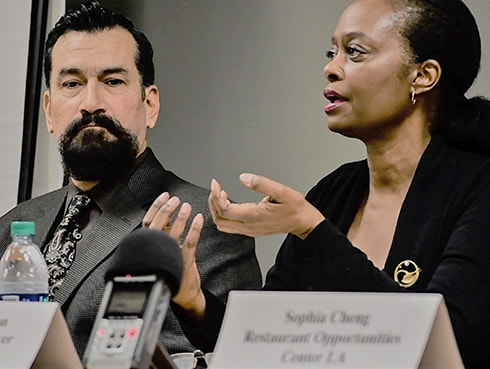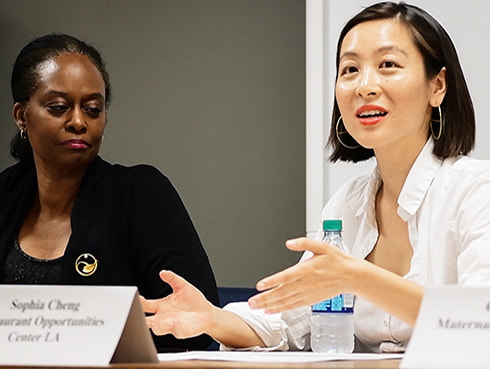
LOS ANGELES,CA-Due to unforeseen complications, Sophia Cheng gave birth to her first child two weeks premature. After losing a lot of blood during labor, she spent the next two weeks in the neonatal intensive care unit recovering as her child lay in an incubator.“At the time, I could barely walk. I was very stressed out,” said the community organizer for the nonprofit, Restaurant Opportunities Center - L.A.
“I was very lucky I knew about paid family leave (PFL), because my job and my income were the last things on my mind.”PFL affords peace of mind by allowing workers to receive a portion of their wages while they take time off to bond with a new child or care for an ailing loved one. But many workers, especially those in low wage professions, have no idea paid family leave (PFL) exists, Chang told a briefing of ethnic media at the LA office of the Employment Development Department recently. She and other panelists said the benefits are drastically underutilized by Californians who are already paying for them via State Disability Insurance (SDI) deductions on their paychecks.The Department hopes that will change following expansions to the PFL program which took effect on January 1.“Retaliation is so real,” said Cheng. “Just the idea that you might lose your job for taking a short term leave definitely deters people.”A lack of knowledge about PFL on the part of both employees and employers also prevents many workers from claiming their benefits in times of need. In surveys, a significant number of participants said they would have taken PFL if they had known it was available, according to the Director of USC’s Family Caregiver Support Center, Dr. Donna Benton. While most people are comfortable with the concept of maternity leave, she notes that PFL benefits apply to a wide range of life changing circumstances.
She said that 90% of caregiving is performed by family members, and one out of four households in California cares for an ailing loved one. However, only 12% of PFL benefits are allocated to people treating relatives dealing with cancer, alzheimer's, multiple sclerosis and other debilitating illnesses. The benefits are also flexible in that they apply to parents, parent-in-laws, siblings, spouses and children of people dealing with severe ailments. They also extend to both mothers and fathers welcoming biological, adoptive or foster children into their families, regardless of their immigration status.
The program is ultimately good for employers as well. It helps mitigate employee stress during crises, and demonstrates that a company cares about the well being of its workers, thereby contributing to job satisfaction and performance, according to Benton.
She said that 90% of caregiving is performed by family members, and one out of four households in California cares for an ailing loved one. However, only 12% of PFL benefits are allocated to people treating relatives dealing with cancer, alzheimer's, multiple sclerosis and other debilitating illnesses. The benefits are also flexible in that they apply to parents, parent-in-laws, siblings, spouses and children of people dealing with severe ailments. They also extend to both mothers and fathers welcoming biological, adoptive or foster children into their families, regardless of their immigration status.
The program is ultimately good for employers as well. It helps mitigate employee stress during crises, and demonstrates that a company cares about the well being of its workers, thereby contributing to job satisfaction and performance, according to Benton.



 RSS Feed
RSS Feed
